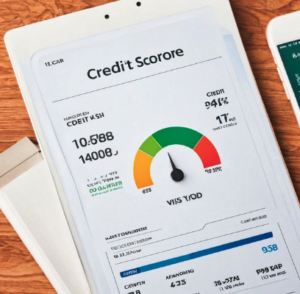
Why Your Credit Score Matters
A credit score is a numerical representation of your creditworthiness. Lenders use it to gauge the risk of lending money to you, determining whether you’re likely to repay loans or credit card balances on time. It’s an essential factor in financial decisions such as getting a mortgage, loan, or even renting an apartment. Credit scores typically range from 300 to 850, and higher scores indicate lower credit risk, which often translates to better loan terms, lower interest rates, and higher chances of approval.
Having a good credit score opens doors to more affordable credit opportunities, while a poor score could result in higher interest rates and difficulties obtaining loans. In this article, we’ll explore several proven strategies that can help you improve your credit score over time. Whether you’re starting from a low score or looking to make incremental improvements, these steps can guide you toward better financial health.
Understanding Credit Scores: Key Components
Before you dive into improving your credit score, it’s essential to understand how credit scores are calculated. Knowing the components will allow you to prioritize the right steps in your strategy.
Payment History (35%)
Your payment history accounts for 35% of your credit score, making it the most significant factor. It reflects how consistently you make payments on time. Late payments, missed payments, defaults, and bankruptcies all negatively impact this component. The longer the payment history without missed payments, the more positively it affects your credit score.
Timely payments are crucial, not just for your credit score but also for establishing trust with lenders. On the other hand, a history of missed payments or defaulting on loans can result in substantial damage to your score.
Credit Utilization (30%)
Credit utilization refers to the percentage of your available credit that you’re currently using. It accounts for 30% of your score. Ideally, you should keep your credit utilization ratio under 30%. For example, if you have a credit limit of $10,000, you should avoid carrying a balance higher than $3,000.
High credit utilization can be seen as a sign of financial distress or overreliance on credit, which can lower your score. Reducing balances and managing credit responsibly can improve this aspect of your score.
Length of Credit History (15%)
The length of your credit history contributes 15% to your credit score. Lenders tend to favor borrowers with a long history of managing credit responsibly because it provides more insight into how well you handle financial obligations. A longer credit history can lead to a better score, while a short history might limit your score potential, especially if other factors are less favorable.
If you’re just starting, it may take time to build a solid credit history. However, keeping old accounts open, even if not used frequently, can help maintain a longer credit history.
Credit Mix (10%)
Your credit mix refers to the variety of credit accounts you hold, such as credit cards, mortgages, installment loans, and car loans. A diverse mix demonstrates your ability to manage different types of credit responsibly. However, it’s important to note that you shouldn’t take on new types of credit just to improve this aspect of your score. Only open new accounts when necessary.
A healthy credit mix, when coupled with timely payments and low utilization, can significantly enhance your credit score.
New Credit Inquiries (10%)
When you apply for new credit, a hard inquiry (also known as a hard pull) is made on your credit report. Multiple inquiries in a short period can have a negative impact on your score. However, a single inquiry usually only affects your score temporarily, and its impact decreases over time. If you apply for multiple credit cards or loans within a short window, it could signal to lenders that you’re in financial trouble, which can hurt your credit score.
Understanding these five key factors will help you focus on areas that will most positively impact your credit score.
Checking Your Credit Report Regularly
One of the most effective steps to improving your credit score is regularly checking your credit report for errors. Errors or inaccuracies can significantly affect your score, and you have the right to dispute them.
Why Checking Your Credit Report is Crucial
Your credit report is a detailed record of your credit history, including loans, credit cards, and payment patterns. If there are any errors—such as incorrect account information, missed payments, or fraudulent activities—it can negatively affect your score. Regularly monitoring your report helps ensure the information being reported is accurate and up to date.
How to Get Your Credit Report
You’re entitled to a free credit report from each of the three major credit bureaus—Equifax, Experian, and TransUnion—once a year. You can access these reports by visiting AnnualCreditReport.com, the only authorized website for free credit reports.
What to Look For
When reviewing your report, look out for:
- Incorrect balances: Ensure that the balances listed for your credit cards and loans are accurate.
- Fraudulent accounts: Check for accounts you didn’t open, which could indicate identity theft.
- Mistaken late payments: Even a single missed payment can hurt your score, so make sure all payments are correctly recorded.
Disputing Errors
If you find any inaccuracies, you can dispute them directly with the credit bureau. All three bureaus provide an online platform for submitting disputes, and they are required to investigate and respond within 30 days. Keep a record of your disputes and any supporting documents in case you need to follow up.
By checking your credit report regularly, you can spot issues early and take corrective action before they negatively affect your score.
Make Timely Payments
Payment history is the most important factor affecting your credit score. Therefore, making your payments on time is essential. Late payments—no matter how small—can remain on your credit report for up to seven years, and they can drastically reduce your credit score.
The Importance of Timely Payments
Timely payments show lenders that you are responsible and trustworthy. Late payments, even by just a few days, can harm your credit score, especially if they’re reported. Each missed payment adds to your negative credit history, making it harder to improve your score.
Set Up Automatic Payments
One effective strategy for never missing a payment is setting up automatic payments. Most banks and credit card companies allow you to automate payments, ensuring that your bills are paid on time without any effort. This approach reduces the chances of accidentally forgetting a payment.
Using Bill Reminders
If you don’t want to set up automatic payments, consider using reminders. You can use apps or set calendar reminders to alert you a few days before your payment is due. Having a system in place to stay organized can ensure that you never miss a payment.
Prioritize High-Impact Accounts
If you have multiple bills, prioritize payments that affect your credit score the most, such as credit cards, loans, and mortgages. Late payments on these types of debts can significantly damage your score, so it’s important to keep them current.
By consistently making on-time payments, you build a positive payment history that will gradually improve your credit score over time.
Reduce Your Credit Utilization Ratio
Credit utilization is the ratio of your outstanding credit card balances to your credit limits. It is a significant factor in your credit score, accounting for 30%. Keeping your credit utilization low indicates that you are not overextending yourself financially.
What is an Ideal Credit Utilization Rate?
Credit utilization ideally should be below 30%. For example, if your credit limit is $10,000, try not to carry a balance higher than $3,000. Maintaining low credit utilization shows lenders that you are managing credit responsibly and aren’t over-relying on it.
How to Lower Your Credit Utilization
The most effective way to lower your credit utilization ratio is to pay down existing credit card balances. The faster you pay off balances, the sooner your utilization ratio will decrease. Also, try to avoid using your credit cards for non-essential purchases to keep your balances in check.
Request a Credit Limit Increase
Another way to reduce your credit utilization is to request a credit limit increase from your card issuer. A higher credit limit will automatically reduce your utilization ratio, provided that you don’t increase your spending. This is an easy way to improve your credit score without having to pay off as much debt.
Avoid Closing Old Credit Cards
It might be tempting to close credit cards that you no longer use, but this can hurt your credit utilization ratio. Keeping old accounts open (without using them) increases your available credit, which can reduce your overall credit utilization rate.
By reducing your credit utilization and managing your balances, you can significantly improve your credit score.
Limit New Credit Applications
Each time you apply for new credit, a hard inquiry is made on your credit report. Hard inquiries can cause a slight dip in your credit score, so it’s important to be strategic when applying for new credit.
What is a Hard Inquiry?
A hard inquiry occurs when a lender checks your credit report as part of their decision-making process. Common examples include applying for a mortgage, car loan, or credit card. While one or two inquiries may not significantly affect your score, too many inquiries in a short period can signal that you’re struggling financially, which could lower your score.
How Multiple Inquiries Affect Your Score
Multiple hard inquiries within a short period can lower your credit score. However, the impact is generally small and temporary. The more inquiries you have, the more significant the effect will be. Multiple inquiries may also result in lenders perceiving you as a high-risk borrower, making it harder for you to secure new credit.
Alternatives to Frequent Applications
Instead of constantly applying for new credit, consider alternatives such as:
- Checking your credit before applying: Many financial institutions allow you to check your credit score before applying. This can help you determine whether you’re likely to be approved.
- Pre-approval offers: Some lenders offer pre-approval without conducting a hard inquiry, so it’s worth exploring pre-approved credit cards or loans before applying.
By limiting the number of new credit applications, you can prevent unnecessary damage to your credit score.
Keep Old Credit Accounts Open
The length of your credit history is a factor in your credit score, contributing 15% to your total score. Keeping old credit accounts open—especially those with positive histories—can help improve your score.
Why Old Accounts Matter
Lenders prefer borrowers with a long credit history because it provides a clearer picture of how well you manage credit. If you close old accounts, you shorten your credit history and reduce your available credit, which can negatively affect your score.
How to Keep Old Accounts Open
- Use old accounts occasionally for small purchases to keep them active.
- Avoid closing accounts, especially those with no annual fees, as long as you don’t carry balances.
- Regularly review your accounts to ensure they are in good standing.
By keeping your old accounts open, you can lengthen your credit history, which positively impacts your credit score.
Improving Your Credit Score Takes Time and Patience
Improving your credit score is a gradual process, but by following these strategies, you can significantly increase your chances of success. Be patient, stay disciplined, and track your progress along the way. With consistent effort, your credit score will improve, leading to more favorable financial opportunities and better terms on loans and credit.
By focusing on timely payments, reducing credit utilization, and monitoring your credit report, you’ll be well on your way to a better credit score and an improved financial future.
Feel free to check out our other website at : https://synergypublish.com

